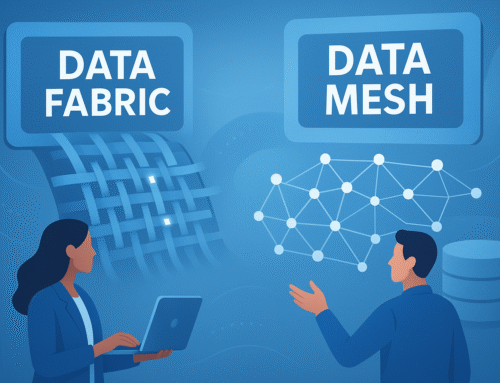In an era where our information is being exchanged like currency, data privacy is the new currency of trust. As of 2025, the business world is coming to an understanding that customer loyalty does not necessarily require exceptional products rather it relies on their responsible approach to approaching personal data.
Big and small, all companies are feeling the pressure to both secure the information of their customers and continue to utilise data to provide personalised experiences. The successful companies know one simple truth: privacy is not a compliance checkbox, but a vow of fidelity.
How then do organizations in the year 2025 find the perfect balance between data-driven innovation and customer privacy? How is the world of privacy changing and what does it take to earn (and retain) customer confidence in the present digital-first economy?
The Future of Data Privacy in 2025.
The last ten years have seen a chain of privacy scandals, data breaches, and increased consumer awareness. Since the Cambridge Analytica incident on Facebook, customers are increasingly wary of who they provide their information to, regardless of their location in the world.
It is not only required by law, but by 2025, data privacy will be a competitive differentiator. Consumers demand transparency, security and control. Companies that cannot deliver risk losing the confidence of its customers – and eventually, their share of the market.
Worldwide governments have even become tighter:
The data protection standard of GDPR (Europe) remains a benchmark.
The Personal Data Protection Law (PDPL) in the UAE, as an element of the digital transformation program, focuses on transparency and consumer consent.
The U.S. and Asian regions have also become increasingly more vigorous in their privacy laws, so data ethics become a business DNA.
Why Data Privacy Will Be Trust in 2025.
The contemporary customer is not only a consumer, but a stakeholder in their own data journey. People want to know:
What data companies collect
Why they collect it
How it’s stored and used
Whether it’s shared or sold
Confidence is achieved when businesses handle user data as part of the person, rather than a business asset to be used.
Organizations that convey privacy in their brand name, not only a fine-print policy, are earning a competitive advantage in 2025.
1. Opacity Is the New Fidelity.
The days of ambiguous We value your privacy statements are long gone. They desire comprehensible, transparent, and available data practices information.
The most popular companies have privacy dashboards that enable users to:
- View collected data
- Delete unwanted records
- Manage sharing preferences
- Get their own information.
- Such control sends a strong message: we respect you.
An illustrative example of companies that have redefined transparency is the tech giants Apple and Google, who provide privacy-oriented features that display to users the data being collected on them and how it is being used. Not only does this guarantee compliance, but it creates emotional loyalty.
2. Data Minimization: Gather Less, Defend More.
Days when businesses stocked up customer data in case are long gone. By 2025, the ethical and strategic standard is information reduction.
The clever firms gather only what is essential to add value. This helps minimize risk, regulatory exposure- and sends a message to customers that their privacy is more important than profit.
Customers are more likely to provide personal data in exchange of personalizations when they feel that brands are not overstepping. It is win-win: improved security of users and increased activity of companies.
3. Privacy by Design and Ethical AI.
With the widespread adoption of artificial intelligence into all digital touchpoints, ethical AI is now the focus of privacy discussions. Algorithms can handle gigantic amounts of user data, whether it involves shopping tastes or facial recognition trends.
Major corporations have switched to Privacy by Design in 2025, which means designing any AI model and digital product with privacy in mind.
This involves:
- Blinding of data prior to analysis.
- Basing it on federated learning (AI learning without the transfer of personal information).
- Bias and misuse auditing algorithms.
AI is not yet capable of personalizing experiences – but in an ethical way. Customers are more likely to interact with brands that are both automated and mindful of their privacy.
4. The Emergence of Decentralized Data Storage.
Hackers have long been interested in centralized data systems. To counter this, a decentralized data repository is transforming data security in the year 2025, and it is driven by blockchain.
Bitcoin technology guarantees transparency, traceability, and tamper resistance. Users are able to view the location of their information and who is viewing it, which makes the online world a more reliable place.
A large number of startups are utilizing Web3 infrastructure to provide users with agency over their own information that they can choose how and when to share with others. This user-centric model is completely compatible with the rising data ownership trend throughout the world.
5. Creating a Culture of Privacy in Organizations.
The first step towards winning customer trust begins internally. By 2025, progressive organizations have understood that privacy is no longer an IT problem, but a company culture.
They are educating all their employees, including marketing, and developers, about ethics in data. Employees know how to manage sensitive data in a responsible manner, how to identify phishing, and how to support data protection policies.
Customer interaction is a natural consequence of making everyone in the company a privacy advocate.
6. Privacy as a Brand Differentiator.
By 2025, privacy is the new marketing superpower.
Companies that emphasize their commitment to protect the data of users are winning consumer confidence at a rate at least three times that of their competitors that only emphasize price or convenience.
Take Apple’s “Privacy. That is iPhone campaign, it changed a technical feature into trust based value proposition. Today, related strategies are assisting businesses in fintech, healthtech, and e-commerce to build a reputation in saturated markets.
Customers perceive privacy as a fundamental brand value, and when they purchase products, they are purchasing tranquillity.
7. Zero-Trust Security Architecture.
As cyber threats have never been more dynamic, by 2025, most organizations will have embraced zero-trust models whereby no user, system, or device can be trusted without justification.
Zero-trust implies on-going authentication, encryption, and monitoring of all interactions on the network. It can majorly mitigate breaches and misuse of data, combined with AI-based threat detection.
Companies can improve their reputation as security-first firms by sending this degree of vigilance to customers.
8. Empowering the Customer with Privacy tools.
The final trust builder is to empower users. In 2025, the privacy tools provided by many companies on a self-service basis include:
- Portals in data consent management.
- Cookie control panels
- Personalized advertising options.
This practical control gives customers the opportunity to make informed choices regarding their data. Feeling empowered, the individuals become truly confident in the brand.
9. Regulatory Compliance: Doing More than the Minimum.
Laws such as GDPR, CCPA and UAE PDPL provide a robust privacy framework; however, when businesses exceed the requirements of the law, they shine.
Proactive organizations have periodic privacy auditing practices, adopt Data Protection Officers(DPOs) and ensure ethical data governance models.
This initiative approach puts across a sense of responsibility, making regulatory compliance no longer a legal liability but a trust building exercise.
10. Communicating Privacy: A Human Way.
The majority of privacy policies are also in legalese that no one reads. By 2025, the major businesses are re-authoring these documents in plain, human language.
They rely on visual instructions, frequently asked questions, and practical examples rather than lengthy technical descriptions of how data is gathered and secured.
This is a mere change in communication that makes the brand more human and the users feel informed, not confused or deceived.
The Bottom Line: Privacy Is the Future of Trust.
Trust is going to be the best form of digital currency as technology keeps getting advanced. By 2025, customers no longer use brand innovation or price to judge a brand, they use integrity to judge the brand.
Businesses that consider privacy as a basic human right, rather than a marketing gimmick, will prosper. Those who do not will be abandoned.
There is one simple principle in the midst of it all:
Customers trust you with their information, they are also putting their lives in your hands, earn their trust, and you will gain their loyalty later in life.


Leave A Comment